I had thought that HashMaps were faster for random access of individual values than ArrayLists . . . that is, to say, that HashMap.get(key) should be faster than ArrayList.get(index) simply because the ArrayList has to traverse every element of the collection to reach its value, whereas the HashMap does not. You know, O(1) vs O(n) and all that.
edit: So my understanding of HashMaps was/is inadequate, hence my confusion. The results from this code are as expected. Thanks for the many explanations.
So I decided to test it, on a lark. Here is my code:
import java.util.HashMap;
import java.util.Iterator;
import java.util.ListIterator;
import java.util.NoSuchElementException;
import java.util.Scanner;
public class Testing
{
public static void main(String[] args)
{
ArrayList<SomeClass> alist = new ArrayList<>();
HashMap<Short, SomeClass> hmap = new HashMap<>(4000, (float).75);
ListIterator<SomeClass> alistiterator = alist.listIterator();
short j = 0;
do
{
alistiterator.add(new SomeClass());
j++;
}
while(j < 4000);
for (short i = 0; i < 4000; i++)
{
hmap.put(i, new SomeClass());
}
boolean done = false;
Scanner input = new Scanner(System.in);
String blargh = null;
do
{
System.out.println("\nEnter 1 to run iteration tests.");
System.out.println("Enter w to run warmup (recommended)");
System.out.println("Enter x to terminate program.");
try
{
blargh = input.nextLine();
}
catch (NoSuchElementException e)
{
System.out.println("Uh, what? Try again./n");
continue;
}
switch (blargh)
{
case "1":
long starttime = 0;
long total = 0;
for (short i = 0; i < 1000; i++)
{
starttime = System.nanoTime();
iteratearraylist(alist);
total += System.nanoTime() - starttime;
}
total = (long)(total * .001);
System.out.println(total + " ns: iterating sequentially"
+ " through ArrayList");
total = 0;
for (short i = 0; i< 1000; i++)
{
starttime = System.nanoTime();
iteratearraylistbyget(alist);
total += System.nanoTime() - starttime;
}
total = (long)(total * .001);
System.out.println(total + " ns: iterating sequentially"
+ " through ArrayList via .get()");
total = 0;
for (short i = 0; i< 1000; i++)
{
starttime = System.nanoTime();
iteratehashmap(hmap);
total += System.nanoTime() - starttime;
}
total = (long)(total * .001);
System.out.println(total + " ns: iterating sequentially"
+ " through HashMap via .next()");
total = 0;
for (short i = 0; i< 1000; i++)
{
starttime = System.nanoTime();
iteratehashmapbykey(hmap);
total += System.nanoTime() - starttime;
}
total = (long)(total * .001);
System.out.println(total + " ns: iterating sequentially"
+ " through HashMap via .get()");
total = 0;
for (short i = 0; i< 1000; i++)
{
starttime = System.nanoTime();
getvaluebyindex(alist);
total += System.nanoTime() - starttime;
}
total = (long)(total * .001);
System.out.println(total + " ns: getting end value"
+ " from ArrayList");
total = 0;
for (short i = 0; i< 1000; i++)
{
starttime = System.nanoTime();
getvaluebykey(hmap);
total += System.nanoTime() - starttime;
}
total = (long)(total * .001);
System.out.println(total + " ns: getting end value"
+ " from HashMap");
break;
case "w":
for (int i = 0; i < 60000; i++)
{
iteratearraylist(alist);
iteratearraylistbyget(alist);
iteratehashmap(hmap);
iteratehashmapbykey(hmap);
getvaluebyindex(alist);
getvaluebykey(hmap);
}
break;
case "x":
done = true;
break;
default:
System.out.println("Invalid entry. Please try again.");
break;
}
}
while (!done);
input.close();
}
public static void iteratearraylist(ArrayList<SomeClass> alist)
{
ListIterator<SomeClass> tempiterator = alist.listIterator();
do
{
tempiterator.next();
}
while (tempiterator.hasNext());
}
public static void iteratearraylistbyget(ArrayList<SomeClass> alist)
{
short i = 0;
do
{
alist.get(i);
i++;
}
while (i < 4000);
}
public static void iteratehashmap(HashMap<Short, SomeClass> hmap)
{
Iterator<HashMap.Entry<Short, SomeClass>> hmapiterator =
map.entrySet().iterator();
do
{
hmapiterator.next();
}
while (hmapiterator.hasNext());
}
public static void iteratehashmapbykey(HashMap<Short, SomeClass> hmap)
{
short i = 0;
do
{
hmap.get(i);
i++;
}
while (i < 4000);
}
public static void getvaluebykey(HashMap<Short, SomeClass> hmap)
{
hmap.get(3999);
}
public static void getvaluebyindex(ArrayList<SomeClass> alist)
{
alist.get(3999);
}
}
and
public class SomeClass
{
int a = 0;
float b = 0;
short c = 0;
public SomeClass()
{
a = (int)(Math.random() * 100000) + 1;
b = (float)(Math.random() * 100000) + 1.0f;
c = (short)((Math.random() * 32000) + 1);
}
}
Interestingly enough, the code seems to warm up in stages. The final stage that I've identified comes after around 120,000 iterations of all methods. Anyway, on my test machine (AMD x2-220, L3 + 1 extra core unlocked, 3.6 ghz, 2.1 ghz NB), the numbers that really jumped out at me were the last two reported. Namely, the time taken to .get() the last entry of the ArrayList (index == 3999) and the time taken to .get() the value associated with a Short key of 3999.
After 2-3 warmup cycles, testing shows that ArrayList.get() takes around 56 ns, while HashMap.get() takes around 68 ns. That is . . . not what I expected. Is my HashMap all eaten up with collisions? All the key entries are supposed to autobox to Shorts which are supposed to report their stored short value in response to .hashcode(), so all the hashcodes should be unique. I think?
Even without warmups, the ArrayList.get() is still faster. That is contrary to everything I've seen elsewhere, such as this question. Of course, I've also read that traversing an ArrayList with a ListIterator is faster than just using .get() in a loop, and obviously, that is also not the case . . .

